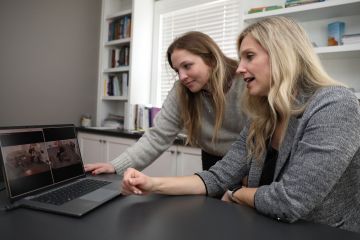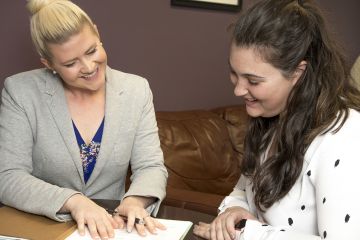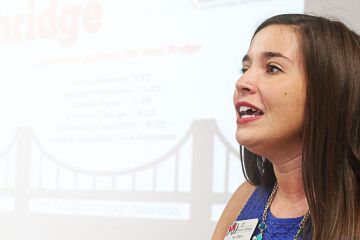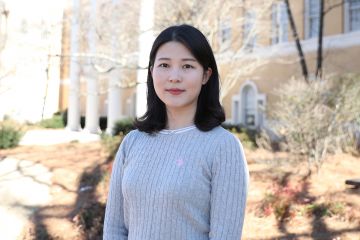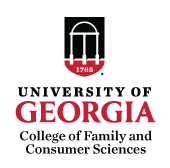A Man with a Fiduciary Mission
To meet Michael Gene Thomas, whose warm, kindly smile and frequent laugh are signatures, is to meet an outwardly easy-going man.
But inwardly, Thomas, a FACS doctoral student studying financial planning, is driven to make meaning in the lives of those with the least financial resources. He cares about ensuring that vulnerable populations have access to financial planning services—a resource that only the affluent usually enjoy.
For a money man like Thomas, this is a tall order, but one he feels suited to deliver. His background (a 2005 degree in accountancy and two years working at a CPA firm) made for an easy transition into working in college admissions and later, as a financial aid planner, at LaGrange College. What was glaringly obvious to him was that the true work of a college was transformation.
For many of the students Thomas helped, he realized this meant transforming their relationships with their money. Credit cards and student debts were sometimes strangling. As students sank into debt, dreams became more of a distant reality.
Cold hard cash—and equally cold, sometimes hard, facts — are in order.
Thomas takes an old-fashioned approach to a newfangled problem. That problem is, first and last, the problem of debt, which is the outcome of financial illiteracy.
Most Americans have little or inadequate savings, let alone investment capital. He would change that, and thinks there is good reason to begin teaching the value of a dollar sooner than later.
The “Millionaire Next Door” approach, wherein people deliberately live beneath their means, is one way of summarizing his financial philosophy.
Thomas, who drives a 10-year-old car (“I hope to get to 500,000 miles,” he joked) is serious about becoming such a millionaire. He tightens his belt—actually, he cinches it—and refuses to be drawn into impulsive buys, ones he might repent at leisure.
Admittedly, says Thomas, living below one’s means is not an easy sell.
“My friends tease me about that car” he says. He simply ignores them.
Thomas was born into a military family, which taught him principles of self-discipline.
“My father was a Marine, and I began school in Oahu,” he said.
The family moved to Jackson, N.C., before eventually moving to Gary, Ind.
He decided to ultimately attend LaGrange in Georgia and earned a degree in accounting there in 2005.
Afterward, Thomas worked in a CPA firm for two years. Later, he was hired at LaGrange as an admissions counselor.
Thomas’s eventual experiences as an auditor, and as LaGrange’s director of affordability and family financial aid planning, made him privy to deeper insights. Some of the students’ financial issues were especially worrying.
“I served in various roles at the college,” he said. “I saw how vital each function was to transform the lives of the students it served. Going through those conversations, those vulnerable conversations, really hit home for me that the work I wanted to do has to happen far before that year and a half you really get to work with families.”
He felt he needed to initiate conversations about finances earlier—as in, well before a student began to apply to colleges.
“As an auditor, I felt isolated. And as a financial aid person, I felt we had a very short window of time to help families,” he said.
This led Thomas to apply to UGA’s financial planning program in the FACS department of financial planning, housing and consumer economics.
Thomas had found his footing and became involved in professional initiatives within the college.
“My biggest accomplishment was helping to create the first financial literacy summer camp for middle school students at UGA,” he said of the Money Dawgs camp.
He had also launched a business, Modom Financial Services. He describes Modom as based upon a different premise, aiming to financially empower the underserved, especially youth and couples.
“I don’t want to get to my finish line alone,” he said. “The reason I am pursuing a financial planning degree is that I want to provide services to the underserved and to the (needy).”
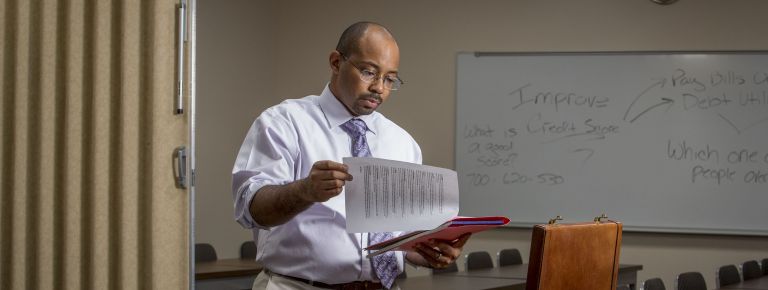
Complicating the work he does, Thomas said it doesn’t help that money and finance are so difficult to discuss.
Why, precisely, is money such a psychologically loaded subject? Thomas smiles at the question thoughtfully before answering.
He is a man who has learned to practice what he preaches: Keep things simple. Live simply.
Money and personal finance, he explains, are a complicated, loaded set of subjects.
“If somebody runs into money, (like a windfall) it emphasizes certain traits about them,” he said.
He shares what he has learned through Modom Financial Services, and the clients struggling with money issues he served both there and through the collegiate programs.
“If they have an addiction problem it magnifies it … money magnifies personal qualities,” he said. “Whether we realize it or not, money is a genuine expression of who we are. If you want to know something about somebody, look at their bank statements.”
He even suggests that couples might want to look at one another’s bank statements before they become too involved.
Money - A more loaded question than sex?
In fact, he doesn’t talk about market fluctuations or how to beat inflation. He talks about things such as financial infidelity and trust issues—chief among other issues that entangle our financial truths.
“I’ve talked with couples in the past, but neither knows what the other is doing with their money,” he said.
Money, he stresses, is a serious subject.
“We’ll talk about sex, we’ll talk about drugs. Everything,” he said. “But it—money—is very difficult; money is very personal. We will talk about sex before money.”
When asked if he, himself, has a healthy relationship with money, Thomas weighs the question. He replies that he is constantly learning and evaluating himself, too.
“Getting your house in order isn’t a once and done … you keep altering it,” he said.
“There are some things I’m working on,” he adds. “For me, my biggest thing is that I don’t take enough (financial) risk. I understand the markets. I talk about my money plan.”
He frowns slightly. Perhaps he is too cautious, he wonders aloud. “Too much of a saver?”
A HUMBLING LOSS AND THE AFTERMATH
Psychological issues have been especially difficult for Thomas since November of 2015, when he had to face down tragedy within his family.
His sister, Tiara Thomas, was murdered just before Thanksgiving, allegedly by her ex-boyfriend, leaving three young children behind. Thomas has since been trying to help his young niece and nephews navigate a nightmare while coping with his own sense of bereavement.
Thomas was close to his sister; he is deeply shaken and the grief is unspeakable.
“Now I know there is nothing worse that can happen to me. Nothing that can make me feel as low,” he says quietly during the week before Christmas.
Thomas says his emotions spill over into his work, leaving him less hesitant or concerned about small things.
“I am now absolutely OK with risks, but they have to be calculated,” he said.
His sister’s untimely, tragic death was gravely humbling.
“We still mean something even though we are but a small piece of the big whole,” he said.
The enormity of what he has experienced has changed him.
“I think it is a breakthrough. At the end of the day, I am intentional about doing my very best, and if it doesn’t happen, guess what? I’m probably going to have another opportunity to do it better … every day, we have an opportunity to do it better.”
Thomas, ordinarily an optimist, is finding a new philosophy to navigate through tragedy. His new philosophy, he has discovered, “is about living in the moment and relaxing into the grand experiment that our lives become.”
An aunt, one who spent her life in the military, told Thomas to stay true to his convictions.
“That was it,” he said.
He is actively building his own legacy. Thomas volunteers with low-income tax assistance and with the Athens work release program through the FACS ASPIRE Clinic.
With the assistance of other UGA undergraduate students, ASPIRE provides six or seven sessions to the prisoners, designed to help them achieve more financial ability and prevent recidivism.
Thomas believes that in supporting prisoners’ access to services and benefits, it will make for a healthier transition to freedom.
“There are so many ways to help people plan,” he said.
After he completes his program, Thomas is leaning toward working with a local agency, one that has a firm and strong commitment to service.
“For me, being in the doctoral program, and aspiring to do the kind of work I do to stay true to my convictions, is keeping me focused,”he said. “Dr. (Joe) Goetz and Dr. (Lance) Palmer, members of the multidisciplinary Healthy Marriage and Relationship Education (HMRE) team, were gracious enough to allow me to be a part of this project.
“The HMRE project will impact a lot of lives. It takes into consideration relationship dynamics, communication, family, therapy, best practices, and the financial capability of this component, working together to create more stable families—emotionally, psychologically, and communicate better. That is the kind of work I want to be doing. How do we strengthen families?”
Thomas says absent that helping aspect, he would have simply completed his master’s degree and immersed himself in a new professional track.
“If this hadn’t happened, I’m not sure I would have done a doctoral program,” he said.
And so Thomas, even in the midst of personal grief, finds meaning in eliminating financial difficulty.
He works with the poorest, the broke and broken, the imprisoned, and the most disenfranchised.
“Love when it is inconvenient,” he said softly.
Thomas writes this online, a sort of personal manifesto, which is a declaration of his integrity:
“All people need is for somebody sitting across from them at that desk to care about them. Let’s show people we care about them, and let’s start there. Then we look at assumptions and race, and can be sensitive to how we talk to them. If we don’t care, you’ve just given me a script.”
This story originally appeared in the spring 2016 issue of The UGA Graduate School Magazine.
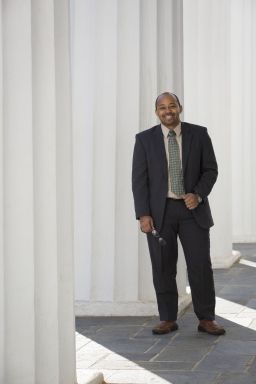
Further Reading
Thomas’s friends have set up a fund for his surviving niece and nephews at:
To learn about ASPIRE:
To learn more about the HMRE project:
FACS department of financial planning, housing and consumer economics:

